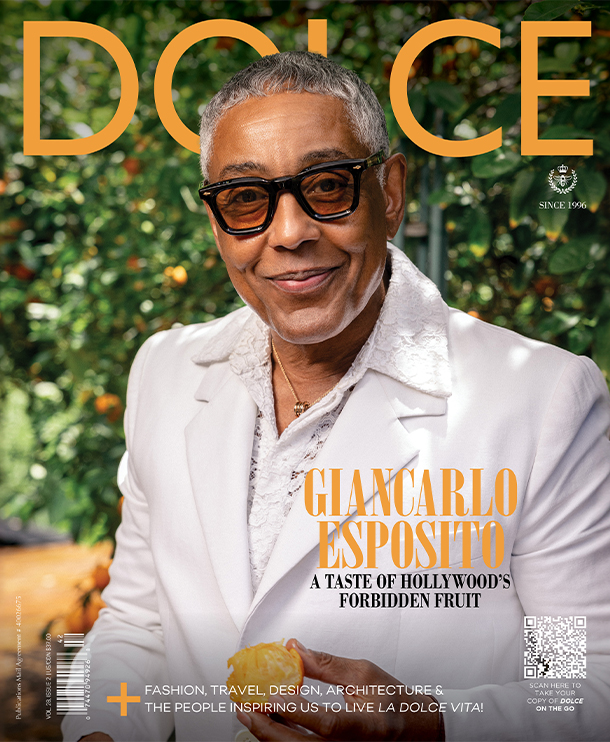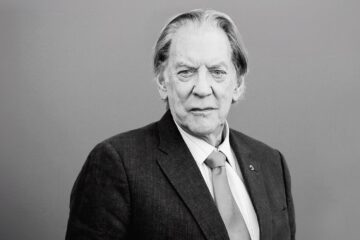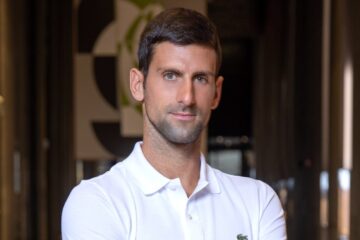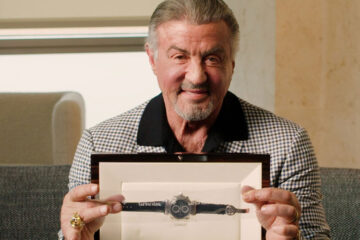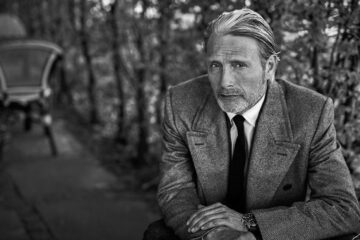The World Is Yours, Nicky Jam
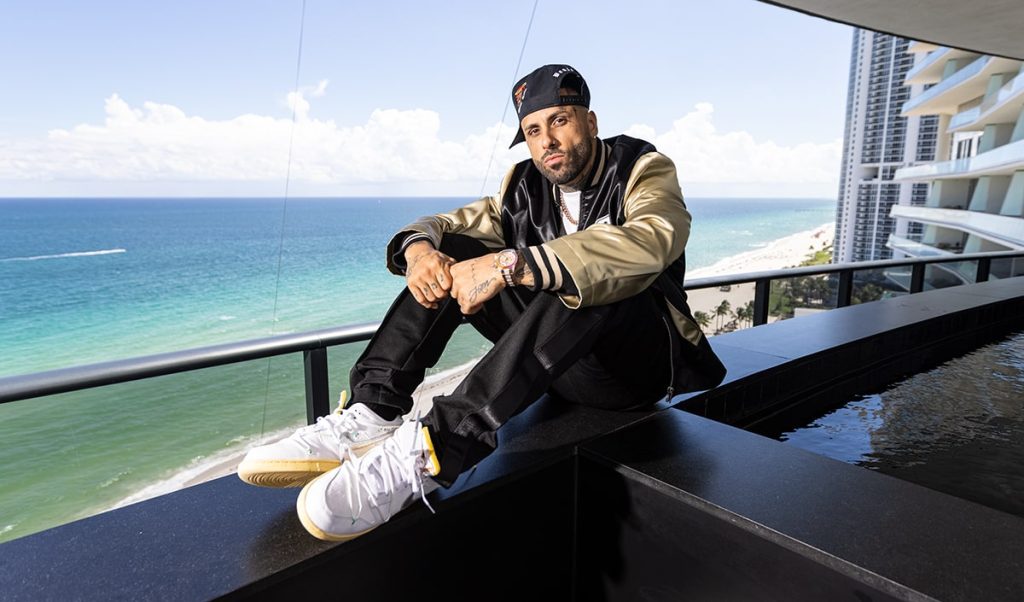
A few months before the start of his new world tour, reggaeton star Nicky Jam reflects on his life story of success, downfall and redemption.
During a famous scene in the classic 1983 movie Scarface, as the sun is setting, main protagonist Tony Montana looks up to the Miami sky when a blimp shows up, with the words “The world is yours” flashing across its screen. Paired with Giorgio Moroder’s archetypal music, it’s one of the movie’s best and most poignant scenes. Forty years later, the world may well now belong to Miami-based reggaeton king Nicky Jam. With four billion cumulated views on YouTube, his Spanish-sung songs about love and loss have attracted a global audience far beyond the limits of urban music fans.
So, it was with great excitement that the Dolce team flew to Miami to meet with Jam at the famous Porsche Tower, directly overlooking the Atlantic Ocean. He arrived on time and was eager to share his memorable life story.
Surprisingly, Jam’s story didn’t start in the Caribbean, but in Lawrence, Mass., where he was born 40 years ago, the son of Dominican and Puerto Rican immigrants. “It was always hard,” he remembers. “Massachusetts is very Irish. There were a lot of Dominicans and Puerto Ricans in my town, and it was the crack era. It was very ugly.” But, Jam admits that some of the reactions weren’t totally unwarranted. “There were bad people who gave our race a bad reputation, and as a people, we all suffered. But, the reality of it is, we made Lawrence our town. Even though it was a crazy town, it was our town. When you make it your town, you live in it, and everybody speaks Spanish. It’s like Miami. We made it our town. Even though it’s part of the United States of America, it’s our town,” admits Jam, echoing the words spoken by Pacino in the Brian De Palma movie. The formative years of Nicky Jam were difficult, but crucial from a musical standpoint. “The rock era was still in style,” he remembers. “So, Metallica, Guns N’ Roses. But combined with hip hop. Run DMC, LL Cool J. It was a combination. I think that helped me. I come from an era with so much music. Today, if you see the top 10 of the Billboard 200, it’s all trap music. I was lucky to see a lot of music: rock, slow jams, R & B, and rap, too. I think that made me a way better musician, because I had all that music inside me. Today, I feel people are stuck with one thing. I’m not too happy about that. Even though I’m an urban singer, I would love to see a rock song be No. 1.”
“Colombia Gave Me Everything I Needed To Be The Man I Am Today”
At a very early age, Jam started getting involved in music. He recorded and released his first EP at 14 years old, an age where many kids still lack the self-confidence to put themselves out in the world. “At the beginning, music was just something that I liked,” explains Jam. “Rapping was just magic. I would just rap everywhere. I never thought it would take me to be a superstar or be a famous person; I just loved it. I loved to see the faces of the people when they saw me do it, because I was so young.” It’s still a bit of a shock to learn the exact age Jam started doing hip hop. “I started rapping when I was eight years old,” he remembers. “It was in English; I was doing freestyle. It made me feel like I was special. Normally, kids who start rapping at eight or nine years old, when they get older, they suck. I was good and got better and better and better.”
Jam’s life story is full of surprises, and the biggest one might be that at 10 years old, after moving to Puerto Rico with his family, he had to learn a new language. Jam had been raised speaking English and didn’t speak Spanish. He put all his energy into fitting in. “When I went to Puerto Rico, I focused on learning the language,” he remembers. “You learn the language quickly when you live in the country. I needed to.” But, how did Nicky Jam also transition from rapping in English to doing it equally successfully in Spanish? His explanation may surprise you. “It’s weird to say this, but, in a way, I’m a genius,” he boasts. “I know that whoever says, ‘I’m a genius,’ he’s probably crazy. But, the reality of it is, I dominate every part of music. I rap, I freestyle, I sing, I have melody, I do it in two languages. I can sing a commercial song, but also a hard-core rap song. I feel that, musically, I’m just very smart. My mind goes so quick. The funny thing is, I left the States when I was 10 years old, so I almost forgot my English, but now I’ve been living here in Miami for five years, I got it back. My mind is crazy, but crazy in a good way.”
After releasing his first EP, he quickly gained popularity in Puerto Rico as a hip-hop artist and eventually met his idol, Daddy Yankee. The two artists then formed a duo called Los Cangris. They achieved success in Puerto Rico through hit singles such as “En la Cama” (“In the bed”) and “Guayando” (“Guava”). However, Jam struggled to adjust to his new lifestyle and began using drugs and alcohol to an extent that concerned his musical partner. Los Cangris separated in 2004 after a disagreement between the two musicians. After the breakup of Los Cangris, Jam struggled personally and professionally. Depressed, Jam gained a large amount of weight, eventually reaching 136 kilograms (300 pounds). He took a job in a hotel, performing lounge music. Despite these difficulties, Jam developed his singing voice at that time, learning to incorporate singing vocals into his music, as opposed to just rapping.
In 2007, Jam moved to Medellín, Colombia, trying to stop using drugs and focus on music. He was well received by the people in Medellín. “Colombia gave me everything I needed to be the man I am today. They gave me a second chance at my career, they gave me so much love. When you have love, you feel that you can conquer the world. The love that Colombia gave me was necessary for a guy who was down, who felt that his security was on the floor. I felt I had a whole country backing me up, to keep working and go forward. I didn’t feel that with my own country. Not that my own country wasn’t good, but because I let my country down, because I wasn’t good. I did a lot of bad things. I needed to move to another place.”
While in Colombia, Jam became healthy. He lost 45 kilograms (100 pounds) and tattooed a significant portion of his body, including his whole neck, which he considered a symbol of his recovery. Artistically, he drew influence from the romanticism of a style of Colombian music named vallenato. “Colombia is so rich in culture. The people are so humble; they give you so much love,” he explains. “They stop doing whatever they’re doing to help you. Even though they come from poor families, they’re always smiling, always having a good time. They’re so clean; everybody smells so good. Women are so beautiful; they enjoy music to the fullest. Colombian guys always have music in their cars when they pick you up at the airport.
Colombia in general is beautiful, but Medellín is magic. It’s always fall there; the weather’s always good. They call it ‘eternal spring — eternal primavera.’ It’s insane. Colombian music gave me a different way of writing. Normally, a reggaeton artist would write about, ‘You mess me up and you’ll see what I’m gonna do.’ Always about sex. Colombia made me write more about, ‘I messed up.’ I didn’t know how to value a woman. It’s OK to say that, and I bring that to the table in songs like “El Perdón” with Enrique Iglesias and “El Amante.” They have melody and they talk about things that normally a man in the urban world wouldn’t talk about. But now, everything went back to the sex. It’s just the way it is. It’s going to come back; you just have to wait for your time.”
Throughout his career, Jam has insisted that the backbone of his music remains reggaeton. But what musical elements make a song a “reggaeton song”? There’s no one better than Jam to explain this. “The foundation is music from the Caribbean,” he says. “It’s a mix of dance hall from Jamaica and the wordplay from Puerto Rico and the hip hop. All this combines to make reggaeton. What makes a reggaeton beat is the percussion [it makes a sound of a bass drum on the first beat, then leaves beat 2 empty, plays the snare on the offbeat, the kick on beat 3 and then plays the snare on beat 4]. There’s so much urban music where you don’t know what’s what. You take Bad Bunny. Obviously, he comes from Puerto Rico; he sings something like, ‘ya yo me entere la la la la la la.’ That’s electronic music, that’s not reggaeton. But, the way he’s rapping and singing, that’s reggaeton. Everybody’s making a cocktail of vibes. That’s what’s making the top 10 right now on the radio stations and on the charts. But, the reality of real reggaeton comes from that beat (he sings the beat again). That beat comes from a 1990 song in Jamaica called “Dem Bow,” from Shabba Ranks. From one beat, we made a whole style of music called reggaeton. If it doesn’t have that beat, it’s something else. It’s a combination of music, but it’s not reggaeton. Reggaeton has that beat, and it’s the Caribbean/Puerto Rican version of dance-hall music.”
Jam’s breakthrough record, both in the U.S. and internationally, is largely considered to be his 2017 album, Fénix. He’s the first one to admit how important it was for his career. “I remember when I was a kid, my uncle told me, ‘We’re like a fénix; we rise up from the ashes,’” he says. “When I was in Colombia, I remembered those words from my uncle. And I said, ‘That’s me, fénix.’ I took it one step at a time. I thought, If I can get a No. 1 hit in this country, I can probably make many deals to have my music distributed everywhere. And that’s exactly how it happened. We didn’t have all that we have today, Spotify, etc. We just had the views, we just had YouTube. But it worked.”
“Live your life because There’s only one life. If you’re going to hug Somebody, hug them like it’s The last time that you’re Going to do it. If you’re Going to laugh, laugh like It’s the last time you’re Going to laugh”
What is impressive is the number of Jam songs with an enormous amount of views online, some of them with more than a billion views. One of them, the 2015 song “El Perdón” (“Forgiveness”), his collaboration with Enrique Iglesias, later won Jam his first Latin Grammy for Best Urban Performance. In 2016, Jam’s song “Hasta el Amanecer” (“Until sunrise”) became his first song to reach one billion views on YouTube. The song won the Billboard Music Award for Top Latin Song. “El Amante” (“The lover”) also reached No. 2 on the Billboard Hot 100. His collaboration with J Balvin, “X,” from the 2019 album Íntimo, peaked at No. 41 on the Billboard Hot 100. The video debuted at the No. 1 spot on YouTube’s global music chart and amassed more than 200 million views in two weeks. “I have more than five songs with a billion views,” he reflects. “It makes me feel good that I’m one of the old-school cats, but I’m still competing with the younger kids in terms of numbers and views. My legacy is my story. How I came from the ashes and how I made it back, how I have all these young kids today enjoying my music. That’s what makes me happy.”
“I show with my Story that, no Matter where you Come from, and how Much at the bottom You are, if you have Discipline and faith In god, you can Make it. I’m living Proof of that. That’s my legacy. That’s my story”
His most recent records contain a few songs sung in English, which is a first for him. But, he largely sticks to Spanish for his biggest singles. “The language is just more beautiful,” he explains. “Way more beautiful. No disrespect to the English language. We sound more romantic, we sound sexier. You can talk to any English-speaking person, [and when] you speak Spanish to them the right way, they will be blown away.”
In August 2021, Jam announced that his first tour since COVID-19 will kick off in early 2022. The Infinity Tour will visit major cities across the U.S. and Canada, starting Feb. 3, 2022, in Boston. Jam can barely hide his excitement at the prospect of getting back onstage. “You can expect a singer who’s crazy about doing a show, and that’s the best thing you can have,” he reveals. “The reality of it is, I used to do so many shows, I was sometimes aggravated by it. But today, I want to perform; I need it. And people are going to feel it. There’s nothing better than having onstage a singer who’s crazy about singing for you.”
Q: You say you’re transparent about the mistakes that you’ve made because the mistakes made by the 20-year-old boy are what make the 40-year-old man. Can you tell me about why this is important for you to share and how it will always be part of your legacy?
A: The reality of everything is that that is my legacy. My legacy is not the Billboards and Grammys and all these awards or all these accomplishments. My legacy is my story. For the people to know where I came from, the hole I came from, how much I suffered and all these obstacles that I had to becoming successful. I show with my story that, no matter where you come from, and how much at the bottom you are, if you have discipline and faith in God, you can make it. I’m living proof of that. That’s my legacy. That’s my story. When I was a kid, I remember my grandfather died before I was born and there’s a street in Puerto Rico and the name of the street is the name of my grandfather. The reason for this is because he helped everybody on the street. He would give his money for a funeral; if somebody needed a hammer, he would help them. That’s my role model, that’s who I want to be and I’m doing that with my story. I know a lot of kids that talk to me and say, “Thank you for your story. I stopped doing drugs and I’m living a better life.” My past was very dark, I was in jail. I’ve done all types of drugs. I was just a rebel because I lost my mom and I didn’t care about life. I was just numb. It’s good to help people and it’s good to hear people say, “Thank you for what you did in my life”. I think music could probably do that, but I think my story has done it way more than my music.
Q: Part of your health journey is working out. I heard that you have a scheduled basketball workout schedule from 4 to 7 p.m. How has sports helped with your mental health?
A: Sports helped me in everything. It changed my life. It changed my way of feeling the way that I feel about myself, because you look good. I sleep better. I do better shows on stage and I just love the sport. I love basketball. I play seven games a day. I train and do weights in the morning. I changed my life and changed the way I was eating and turned myself into a healthy person. I think that’s the best thing in the world. I didn’t do that my whole life. I was just punishing my body, and punishing my soul and making myself not even care about myself. When you love yourself, it’s easy to love everybody else.
Q: What makes you proud to be a Latin artist and can you talk about how the Latin music genre is continuously growing and becoming mainstream in the U.S. market?
A: I love being a Latino, like anybody would love where they come from. I love my people, I love my culture, and we have so much that people don’t know about. I’m happy that finally people know about how good we are and all the talent we have, and it’s not just the typical Pablo Escobar, dealing with cocaine and prostitutes, etc. … We have so much to give. We have so many beautiful things. We have hard-working people, beautiful music, beautiful food.
Q: How would you describe your style, and how does it play into your work? Have you always been interested in fashion?
A: My style is very urban. I’m very bad boy, hardcore, “I-don’t-care” type of vibe. I’m very risky. I will tattoo any part of my face, but even the kids love that when they see me. I like the attention, I like having that. The crazy thing is that even though I have all these tattoos, you can still see my soul. You can still see that I’m a good kid, that I’m humble and that I’m a nice person. I’m glad that I have all these tattoos, and you can still see through me and say, “He looks like he’s a cool guy, a nice guy.” It’s just my vibe; I’m very simple. I don’t like wearing too much stuff, because I think I already have too much on my body. Just T-shirts, plain T-shirts, and I love dressing very retro. I love the ’80s, I’m fascinated by the ’80s, ’90s.
Q: Can you tell me about your latest project, La Industria Bakery & Cafe? Did you ever imagine that music would lead you into different opportunities outside of music itself?
A: You know, you dream. I dreamt about so many things, and, of course, having a restaurant was always one of my dreams. Having hotels, acting, having my podcast show — all of these things. My mentality was that I cannot be stuck in one thing. I have to do a lot of things. During the pandemic, I was going to these brunches in Miami, and I realized that Latino people don’t have a brunch. It wasn’t really part of the culture of the Spanish people. I wanted to do a Spanish brunch place and I’m a really big fan of pancakes. La Industria Bakery is one of the most successful businesses I’ve ever had. It’s insane. We make money in pancakes like a five-star restaurant makes in high-class gourmet food. I’m very blessed and very happy, and it’s cheap to make pancakes. People know it’s Nicky Jam’s spot and so they all go and take a picture. It became a tourist place for the Spanish people, and everybody else from Europe who comes here — they want to go to “The Industry Bakery” and eat pancakes. I’m opening up three more: one in Colombia, one in Puerto Rico and one in Orlando, Fla.
Q: You said once, “I’m always working like I’m about to lose everything.” Can you speak on that in general and how it navigates your work ethic?
A: I am a workaholic. I feel like I work more now than I did in the peak, or buzz of my career. I lost everything once, so my mentality now is that I’m not going to go through that again. I just work every day like I need it. Even though today I’m comfortable, and I don’t really need to, that’s what makes me more successful. The reality of everything is that I’m the type of guy who loves spreading my energy and I love other people to feel that. I don’t stop. I wake up every day at 7 a.m., I go to the gym from 9 to 10 a.m., I work on music from 11 a.m. to 4 p.m. I play basketball from 4 to 7 p.m., and I’m working on other businesses. I’m opening three more restaurants, opening a hotel, I have my podcast show, I’m working on so many songs, so many projects, and it feels good. There was a time in life where I couldn’t work, because nobody cared about me. Nobody cared about my brand. And now that I have a brand, I should take advantage of that and be grateful for what God gave me.
RAPID FIRE
Q: Favourite brunch meal?
A: French toast, three eggs over hard.
Q: What makes a song sexy? Is it the rhythm, the lyrics?
A: A combination of everything. The lyrics, obviously, because what you say is sexy, but the melody can be sexy as well. It’s a combination.
Q: Where do you feel most at peace?
A: The ocean. That’s why I like Miami. I have my boat and I’m always in the water. I would say the ocean or when I’m with my dad. When I go back home and I’m with my dad, I feel like no matter what’s going on in the world, I’m with somebody who has so much wisdom and so much soul. And I feel like your parents are closer to God in some way. I feel like we’re still in the world crazy, and they’re already more in touch with God. I feel like I’m closer to God when I’m with my dad.
Q: What is your biggest fear?
A: I’ve had a lot of fears in life, but today my biggest fear is not to be there for my kids when they need me. I think it’s the only thing that worries me. I don’t care about anything else. No material things, no music, no nothing. I just hope that when my kids need me, I’m there. That’s my only fear.
Q: What does la dolce vita mean to you?
A: The sweet life? The reality of everything is that I haven’t had a sweet life. It’s been a crazy life, but I love it. I love my crazy life. I’ve had sweet moments, but the sweet life, it doesn’t sound like a Nicky Jam life. La dolce vita sounds like a person who lives on a farm and has no worries and has a very simple life. To be honest with you, to be a performer the way I am and to live my life, there’s no dolce vita. I did live a simple life for a time. I went to a farm in Colombia, a very beautiful farmhouse, one of the most beautiful homes I’ve ever seen in my life. Not expensive, just beautiful. A cow came through my window, I fed it. I didn’t even know cows eat food. I thought they just ate grass, but this cow would eat anything I gave it. That was the closest to a sweet life.
Q: If you had to share an inspirational message with your fans, what would it be?
A: Live your life, because there’s only one life. If you’re going to hug somebody, hug them like it’s the last time that you’re going to do it. If you’re going to laugh, laugh like it’s the last time you’re going to laugh. If you’re going to kiss somebody, kiss somebody with passion, like it’s the last time you’re going to kiss that person, because you only have one life and you have to live it to the maximum. That’s the only advice I could give because at the end of the day, we don’t get a second chance at life. We just have one.
Photography By Jesse Milns
Story Written And Interview By Cezar Greif
Q&A And Interview By Estelle Zentil
Photoshoot Location: The Porsche Design Tower
Publicist: Nini Veras
Stylist: Norma Castro, Nicole Aguirre (Stylist Assistant)
Wardrobe Stylist: Anna Ruiz @annaruiz.mia Represented By Agency Gerard Artists, Vanessa Mariah (Assistant)
Producers: Michelle Zerillo-Sosa, Cezar Greif
Groomer: Luis
Video By Daniel A. Cooper




